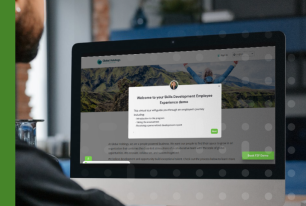Governments Are Pushing for Skill-Based Talent Strategies—Here Is How Enterprises Can Respond
Governments around the world now recognize that skill-based talent strategies are critical for building future-proof organizations. Learn how enterprises can respond, to stay on top of the game in this age of disruption.
Share
According to the Mahābhārata (the longest epic poem), the critical skills Arjuna honed (battle weapons, music, and dance) during thirteen years of exile reinforced the victory of his dynasty, Pandavas. While celestial weapons for battle helped Arjuna win the Kurukshetra War, the music and dance skills that he gained during one year of agyatvas (incognito exile) helped him to reflect and focus on reimaging and preparing for future scenarios, leading the Pandavas to emerge victorious.
As new needs and priorities emerge in today’s ever-changing business environment, we have learned that agility to learn new skills by employees and organizations is the only way to maintain operational continuity and have a competitive edge. The businesses that will be best equipped to rapidly respond to change are the future-proofed organizations that are built on a foundation of skill-fueled agility.
Skills have always been the backbone of the working world, but they were not always something leaders prioritized and strategically invested in. However, governments around the world now start to recognize that building skills are imperative for enhancing business competitiveness and supporting employment and employability. For example, the government of India’s Future Skills Prime (FSP) is one of the country’s most important upskilling initiatives jointly undertaken by MeitY and NASSCOM which directly impacts hundreds of thousands of Indian youth. Another example is Singapore’s Skills Future, which provides a framework that aims to create a common skills language for individuals, employers, and training providers. This further helps to facilitate skills recognition and support the design of training programs for skills and career development. Skills are the heart of such government-led foundations, and the right approach to upskilling and reskilling can pave the way for impressive bottom-line results.
McKinsey research recently identified that skill building is the best way to bring business transformation, positive economic return, increased productivity, improved employee morale, and enhanced retention rates. By knowing how work will change and the impact on skills demand, organizations can reskill or upskill their people to future-proof their workforces. The organization can communicate the business’s critical skills and the aspects of business that will drive future value creation, giving employees a line of sight into their future employability and income potential.
“The illiterate of the 21st century will not be those who cannot read and write, but those who cannot learn, unlearn, and relearn.” - Alvin Toffler (American futurist, author, and management consultant)
Why it is important to shift to a skill-based talent strategy
As we move further along in the decade of disruption, having the right workforce skills can be a market differentiator for organizations. Skill-based talent strategies and practices help develop a more sustainable and democratic workforce model. Organizations should upgrade the talent strategy based on skill-fueled practices to create impact as below:
- Career pathways - Offer each individual new possibilities as they navigate through careers
- Reskilling and upskilling – Identify the potential in your people and empower them to grow
Skill building is the best way to bring business transformation, positive economic return, increased productivity, improved employee morale, and enhanced retention rates.
In-depth analyses of proprietary SHL data across time have identified the key skills and competencies of the future. Those who exhibit capabilities in continuous learning and innovation, insightful analytics, collaboration, network performance, and execution excellence are more likely to be equipped or thrive during changes. Addressing critical talent gaps by looking in new places where those skills already reside is imperative, wherefore SHL created a revolutionary insights platform that provides futuristic career pathways by:
- Providing impactful and targeted career enhancement options in the hands of your employees, with automated, personalized reports
- Supporting all your workforce planning decisions with a single source of reusable, scientifically validated people data
- Providing real-time actionable potential insights at individual, team, and organization level.
In 1931, Winston Churchill wrote:
"The scientific achievements of the next 50 years will be far greater, more rapid, and more surprising, that those we have already experienced... But this is only a beginning"
The Fourth Industrial Revolution is expected to transform one-third of all jobs in the next decade. Augmented reality tools now provide a real-world view of difficult situations providing more insights for upskilling and reskilling for future roles. ChatGPT, for example, has the potential to make a significant impact in the workplace by automating business processes and enhancing communication. This could improve efficiency, increase employee engagement, and ultimately contribute to business growth. Goldman Sachs estimates that this technology could boost global GDP by 7%.
To emerge victorious to such rapid technological and environmental changes, skills should be treated as the currency of the future applicable across roles and industries. Equip people to take on new responsibilities or move quickly into new roles as business requires to build a future-proof organization. Challenging existing approaches to strategy and embracing a new skills-based talent strategy and philosophy that overcome the talent skill gaps is of paramount importance. The talent strategy chosen by organizations should provide transparency into future skill requirements and enable, facilitate, and empower employees toward critical roles.
Read our latest white paper on skills of the future and where to find them across geography, industries, and time. Book a demo with one of our experts today, so we can help you future-proof your organization through our talent solutions!










